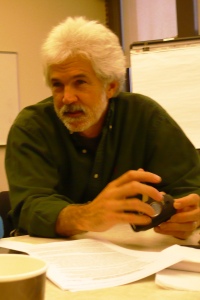About

The Charlotte W. Newcombe Doctoral Dissertation Fellowship
Kim J. Hopper
CN ’86
A Saner Approach to Mental Illness
Kim J. Hopper CN ’86 explores new models of care
The biggest problem in mental health is our tendency to compartmentalize mental illness—to separate people with mental illness from others and to separate mental illness from overall health. “Mental illness almost invariably is a sidecar to some other discussion, rather than a more general discussion about what it means to think seriously about health in a variety of departments,” says, Dr. Kim J. Hopper CN ’86, medical anthropologist and professor of clinical sociomedical sciences at the Mailman School of Public Health, Columbia University and co-director of the Center for the Study of Issues in Public Mental Health at the Nathan S. Kline Institute for Psychiatric Research.
Improving the quality of life for people with mental health issues, one of Dr. Hopper’s main concerns as a medical anthropologist, necessitates collaboration from other institutional entities that do not see mental health as part of their purview. In a recent project, Dr. Hopper and his colleagues reimagined all people with severe mental illnesses in New York City—regardless of their living situation, whether with family, institutionalized, or on their own—as inhabiting their own country, then applied Amartya Sen’s capabilities approach and the United Nations Human Development Index. The analysis showed that “they live at roughly the level of a Moroccan peasant. Their life expectancy can be as much as 20 years less than other folks. Their literacy rates are terrible and their income is set at a rate that essentially expects them to live for free every sixth day.”
So if the ability to pursue a life of one’s own is an index of recovery from mental illness, what would it take to help these New Yorkers recover? “It takes not only a great deal of work on individual agency, Sen’s engine of development at the individual level,” Dr. Hopper notes, “but it also means reworking the environment so that the necessary resources are available to feed that agency: education, jobs, and, of course, affordable housing—resources which for this group are in restricted, and often qualified, settings. We argued that mental health could not do its job without the partnership and collaboration of these other institutions. We found, for the most part, that there was no conversation going on, so it managed to get a lot of conversations started.”
Through this work Dr. Hopper got involved in the recently funded Parachute NYC program, which seeks to change the way health and social professionals respond to young people in a mental health crisis, minimizing initial damage. Borrowing from a Scandinavian public psychiatry model of crisis response/respite, the Parachute program will offer a “soft landing” instead of a traumatizing “hospitalize/diagnose/medicate” response. The first response will be to convene the family and other affected parties into working groups led by therapeutic teams. “[It] tends to hold back on the question of ‘Is this a mental illness and if so, what’s its name?’ in favor of ‘What’s going on here and how can this group be differently configured so that everybody can live together?’” If the individual does need to be extracted from the family setting, he or she receives a crisis respite placement in a non-hospital, non-medical setting, staffed by peers who have been through similar ordeals. “It’s got more than its share of implementation difficulties,” says Dr. Hopper, “but it’s also got some really interesting implications.”
It was during his work as a Newcombe Fellow that Dr. Hopper became interested in questions about mental health care. “I was in philosophy of religion, doing work on values and philosophy and trying to figure out how they should apply to medical quandaries in the clinical setting,” he recalls. “The more I got into it, the more I realized that the values that we really should care about are ones that are built into everyday assumptions about right and wrong, proper and improper, good and not-so-good. That’s what I took to mental health, because it’s those assumptions about essentially what’s good enough for people with mental illness that need challenging,” explains Dr. Hopper. “It’s about trying to find a better way of asking how we establish a floor beneath this question of what suffices as adequate for a variety of quality of life issues for people who have this diagnosis or have seen this diagnosis sometime in the past. My issues are still all heavily driven by that concern.

